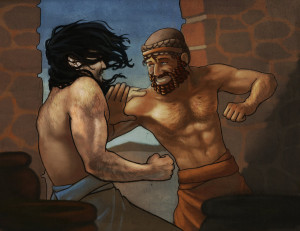

In Gilgamesh’s youth, he was a ruler and was, for the most part, praised by the inhabitants of the city of Uruk. At this time, death did not concern him. He lived as if he were invincible. Later in the epic, a powerful man named Enkidu shows up in Uruk and helps put Gilgamesh’s power into balance. Together Enkidu and Gilgamesh set out on adventures and achieve many feats; however, one cannot forget why Enkidu was created in the first place. Enkidu was sent to Gilgamesh because his power was overstepping its bounds and “Gilgamesh would not leave [young girls alone]” (“The Epic of Gilgamesh” 50). Although overall a popular ruler, Gilgamesh is at one point portrayed as a demanding ruler that disregards the wishes of his subjects and rapes women as he pleases. In this regard, does Gilgamesh deserve immortality in the first place? This deeper philosophical question must be addressed before one begins to understand why immortality is an impossibility for Gilgamesh. Gilgamesh may have asked himself this question, which may have made him ponder his own worthiness of being immortal. These thoughts helped catalyze his fear that he would die just like the people he ruthlessly ruled over. In other words, the questionability of his morality might have driven his quest for eternal youth.
During one adventure, Enkidu and Gilgamesh go to the Cedar Forest and Humbaba, a monster tasked by the gods with guarding the forest, confronts them. After a long struggle, Humbaba begs for his life, but Gilgamesh, encouraged by Enkidu, kills him anyway. The gods find out and are angry at this defiance and ultimately kill Enkidu as punishment. After all, Humbaba was innocent and did not deserve to die. When Enkidu dies and “has turned to clay” in Gilgamesh’s arms, Gilgamesh, petrified that he will experience the same fate, “roam[s] open country for long distances; [as the] words of [his] friend Enkidu weigh upon [him]” (“The Epic” 104). When Enkidu dies, Gilgamesh goes into a depression and cannot stop mourning the loss of his friend. He talks to Enkidu’s body as if it was still alive and refuses to bury him. Gilgamesh is depressed and fearful for his own life for several reasons. He has had very few close friends in the epic that we know of and when his best friend dies, Gilgamesh does not know what to do without Enkidu and becomes delusional about his situation. Gilgamesh becomes more aware of his mortality because Enkidu’s strength matched his own when he was killed. Gilgamesh resolves to conquer death.
Gilgamesh is determined to live forever, and he begins to track down a mortal named Utnapishtim who was granted eternal life. Gilgamesh overcomes many obstacles to reach this man, some of which no mortal had ventured through before. Finally, when he meets Utnapishtim, Gilgamesh explains his desire to be immortal and his fear of death. Utnapishtim challenges him to “not sleep for six days and seven nights” (“The Epic” 116). He is determined to complete this challenge and prove to Utnapishtim and himself that he deserves immortality, however “sleep breathes over him like a fog,” and he is unable to stay awake (“The Epic” 116). Eventually he is awoken and thinks he has only been asleep for a few minutes. He is still full of despair confident that death is fast approaching. His journey ends in failure, but also leads to an important epiphany. He discovers that it is better to die happily than live in fear but it is unclear if he actually embraces this revelation. Regardless, his journey makes him a wiser ruler.
Death itself invokes fear. We know it exists but not where it leads. The mystery of death, combined with the Mesopotamian outlook, leave fear and sadness to cultivate in the mind of Gilgamesh. Gilgamesh says, “nobody sees the face of Death. Nobody hears the voice of Death” (“The Epic” 108). He goes on, nothing that “death [is a] picture [that] cannot be drawn” (“The Epic” 109). This form or force that is death cannot be explained. Gilgamesh believes that something that cannot be heard or seen but that can strike and kill at any moment is something to be feared. Death gives us no clues as to what happens after life. We can only speculate as to how this mysterious element operates. Ultimately, all we know is that the human body decomposes. This grim outlook, this hourglass of life constantly being depleted, leaves Gilgamesh feeling only empty and mournful.
Some argue that Gilgamesh has already achieved immortality. Although he is physically dead, his stories and journeys live on through the written word. His tale has been copied and translated into many texts and languages. In this sense, he has indeed gained everlasting life. He lives on not through his body but through ink and paper. However, when Gilgamesh sets out to find everlasting youth he is trying to escape a physical death so that he may exist on earth forever. Living metaphorically would not have been sufficient for Gilgamesh. Some of the legends portray Gilgamesh as a spiteful and violent ruler, yet Gilgamesh is no longer alive and cannot influence how his stories are interpreted. In this sense he has no control over his existence. Although we read about him today, he was ruler of the past, and is no longer alive in the present.
Gilgamesh prepares to leave Utnapishtim, still unsuccessful, afraid, and upset. However before he bids farewell, Utnapishtim reveals a secret of the gods. He informs Gilgamesh that there exists a thorny plant in the Apsu that restores youth. Upon hearing this Gilgamesh weighs himself down and dives into the sea to recover the plant. Even though Gilgamesh finds this plant, he does not consume it on the spot. He decides to wait and “give it to an elder to eat, and so try out the plant” (“The Epic” 119). However since it was never tested, one cannot be sure that the plant will do as it promises in the first place. When he discovers the plant is stolen, sadness takes over him as “tears flowed over his cheeks” (“The Epic” 119). Except for the death of Enkidu, this is the only time that Gilgamesh cries. Alone and afraid, Gilgamesh realizes that his last chance to find immortality has passed. However, there is no confirmation that the plant restores youth, so one cannot say with certainty that immortality exists in such a form. Although Gilgamesh was not able to try the plant himself, the snake which stole the plant may have experienced the plant’s effects. The night that the thorny plant was stolen by the snake; “it took it away, [and] it shed its scaly skin” (“The Epic” 119). This quote in the epic reveals an ambiguity. When the snake sheds its skin, it could be aging or getting younger. Because this is ambiguous, we cannot confirm that immortality existed in the form of a plant. Supposing the plant was actually effective, Gilgamesh would have logically dived back down to get more of the plant. This leaf of life is more symbolic and is utilized to show that immortality, like death, is not tangible. Gilgamesh is accustomed to fighting forces that he can see such as Humbaba, the Bull of Heaven, and other warriors. When he deals with immortality which has no physical form, Gilgamesh is disappointed and ultimately unprepared to fight the unknown.
Evidence clearly shows that Gilgamesh died a fearful man, vainly clutching the dream of immortality. When he saw powerful Enkidu die, he realized that he would see the same fate 
Read Also: How to write a Critical Thinking or Dialectic Essay in Philosophy

You must be logged in to post a comment.